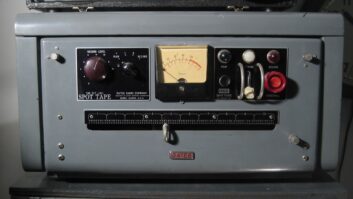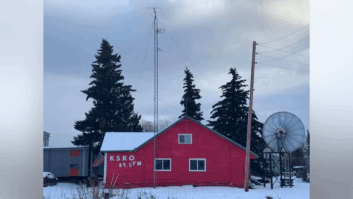A while ago, Radio World Editor in Chief Paul McLane forwarded me a letter of a type that he frequently gets. It asked for help in disposing of a collection of old radios, radio parts and radio-related memorabilia that were part of a parent’s estate.
I’ve been a lifelong collector of radio/television artifacts (which range from vacuum tubes to microphones, receivers and even one broadcast transmitter), so Paul asked me to try to help the person. Radio World continues to receive such inquiries. Perhaps you’re looking to dispose of such items yourself or, more likely, someone has asked you for your own advice.
The first question I have regards cataloging or inventorying of the collection. Has this been done? Having a complete and accurate listing of what you want to dispose of is important. Regardless of whether it’s radios, vacuum tubes, microphones or whatever, you will need a comprehensive list of what exists — make and model or type, where known. A serious collector will not typically respond to an ad listing an “old radio or TV.”
Other necessary information concerns the physical size (volume and number of pieces) of the collection. Is it all out on display, or mostly packed away in boxes? Would it fill a minivan, or would it require a 18-wheeler tractor-trailer to accommodate it all?
In our internet age, the first thought of many people in your situation is to start listing pieces on eBay, Craigslist or maybe even in the classified section of a local newspaper or similar publication. However, this is not really a good idea if you don’t have some idea of what the pieces are worth. You stand to (1) lose money by setting too low an asking price, or (2) discourage potential buyers by setting the price artificially high. There is a fine line here and it would behoove you to find someone you can trust to appraise items properly.
I need to offer an additional strong warning before you start any form of advertising. There are many opportunists and predatory persons who exist only to take advantage of individuals in your situation.
There are numerous stories in the world of collectibles about such persons and their scams. One involved a pair of “collectors” who worked as a team to take advantage of a collector’s family members. One “collector” would respond to the ad offering equipment for sale and set up an appointment for viewing the items. The other party would then schedule an appointment that overlapped with that of the first “collector.”
A reasonable price would be established for a particular piece or pieces by the first team member and then the other person (who pretended not to know the first) would interrupt by stating that the price for the piece was unreasonably high and then offer to sell the first “collector” a similar or identical piece from his own collection at a much lower price. Human nature being what it is, the family member would usually drop her price to match or better that being offered by the “shill.”
In other cases, the “collectors” would pay separate visits to view the collection and convince the owner that the items were of little value, causing the family member in desperation to sell for any price offered.
I don’t mean to frighten you, but I hate to see anyone get hurt. The individuals who I mentioned managed to con a number of people into selling some priceless gear at junkyard prices.
I also advise against giving anything to anyone for sale on a consignment basis, unless you know them to be honest. I know of several people who have been burned by consignment sellers that reported much lower sale prices than actually received, thus depriving the owners of substantial amounts of money.
GET EXPERT HELP
With these warnings in mind, what should you do?
My first suggestion is to contact a local radio collectors’ group for assistance in assessing the value of the collection. Collecting and restoring old radios and similar gear has become popular during the past several decades, and a number of clubs and associations exist in many states.
There is at least one publication that deals exclusively with radio-related collectibles — Antique Radio Classified — and offers a comprehensive listing of such collector’s organizations on its website. This would be a good starting point for anyone seeking assistance in placing a value on a collection and/or disposing of a collection at realistic prices.
There are a number of museums in the United States devoted to radio and television history. Personnel at these establishments should be able to help establish the value of antique gear.
Many of these are chartered as non-profit/tax-exempt organizations and accept donations in the same manner as charitable groups. Depending upon one’s tax bracket and the value of the donation, gifting your collection to such an institution may be of some value in reducing your income taxes if you don’t wish to sell the collection outright. An internet search may turn up one or more in your area.
Also, the National Capital Radio & Television Museum, located in Maryland, does provide a fairly complete list of similar museums, as well as collectors’ clubs and related groups on its website, with links to each of these. You will find this listing here.
If you want to dispose of a really large collection (I’m thinking of hundreds of pieces — a barn, several rooms or considerable commercial storage space filled with old radios/TVs), you might want to consider enlisting the help of a professional auction company. If you elect to go this route, make sure that the company has experience in liquidating radio/TV collectibles, otherwise you’re back to square one in terms of establishing fair values for such items. Radio/TV collector groups and museums may be of assistance in directing you to a qualified auction company.
TAKE YOUR TIME
I leave you with a few “don’ts”:
- Don’t be in too great a hurry to dispose of the collection. Get several appraisals or at least several opinions from knowledgeable persons as to the fair value of the equipment.
- By the same token, don’t list items for online auction unless you have a good idea of their value.
- Don’t get suckered into selling at unrealistically low prices. (“I’ll give you a hundred bucks for the whole lot!”)
- Don’t automatically assume that just because it’s old that it’s valuable. Drive through most any neighborhood on trash collection day and you’re likely to see 1970s/’80s TV sets piled on the curb with the CRT computer displays.
- Last, don’t discard anything that could be of value to a collector or museum. There are way too many horror stories of one-of-a-kind or otherwise priceless relics winding up in landfills when they should have gone to the Smithsonian or a similar institution.







